- Isaac Blackford
Infobox Politician
name =Isaac Blackford

caption =Isaac Blackford from "Who-When-What Book", 1900
order =
office =Indiana Territory Legislator
term_start =1813
term_end =1814
lieutenant =
predecessor =
successor =
office1 =Indiana House of Representatives
Speaker
term_start1 =1816
term_end1 =1817
speaker1 =yes
predecessor1 =
successor1 =
office2 =Indiana Supreme Court Chief Justice [ [http://www.indianacourts.org/Justices/bychron.aspx Indiana Supreme Court Justices] ]
term_start2 =September 10 ,1817
term_end2 =January 3 ,1853
predecessor2 =John Johnson
successor2 =
birth_date=November 6 ,1786
birth_place= Bound Brook,Somerset County, New Jersey
death_date=December 31 ,1859
death_place=Washington, D.C.
spouse = Caroline McDonald
party =Democratic-Republican Whig
alma mater =Princeton University
religion =Methodist Isaac Newton Blackford (
November 6 ,1786 -December 31 ,1859 ) was the longest servingIndiana Supreme Court in Indiana history and wrote an eight volume work recording all the early decisions of the court. He was an unsuccessful 1825Whig candidate for Governor and Senator. He served as a federal court judge from 1855 until his death.Biography
Early life
Blackford was born on November 6, 1786, in Bound Brook,
Somerset County, New Jersey . He enteredPrinceton University at age sixteen and graduated four years later in 1806. After college he studied law for a year in the office of Colonel George Macdonald and completed his legal studies in the office of Gabriel Ford, ofMorristown, New Jersey in 1810, he was admitted to the bar that same year.Dunn, p. 335]In 1812 Blackford moved west to the
Indiana Territory first living in Brookville and then Salem. He carried with him letters of introduction to JudgeIsaac Dunn and others in the legal territory's legal community helping him to be quickly established. Blackford was clerk and recorder inWashington County, Indiana .In 1813 Blackford moved to Vincennes. The same year he was elected principal clerk for the
Indiana Territory House of Representatives, but resigned when he was appointed a judge in the 1st Circuit Territorial Court, where he served from 1814 until he resigned in 1815. He then opened a law office in Vincennes. He was elected as aDemocratic-Republican member to the firstIndiana House of Representatives from 1816 to 1817 and was chosen Speaker during his term.Dunn, p. 336]upreme Court Justice
In 1817, Blackford was appointed to be Chief Justice of the
Indiana Supreme Court by GovernorJonathan Jennings to replaced Justice John Johnson who had died. He served on the court until 1853 making him the longest serving justices in Indiana history. He earned a reputation for being fair and impartial and is regarded as one of the most influential and pivotal members of the court. His reputation stems from the fact that he wrote all the reports of the court decision for the first thirty-five years of its existence that established the foundation of the state's judiciary.Blackford's reports were thorough and detailed and he strove make them as accurate as possible. On one occasion a lawyer, Samuel Judah, seeking to delay a decision, questioned Blackford on the spelling on a word he know would be in the report. Blackford responded with the spelling and Judah again questioned him if he was certain. Not wanting to be hasty and enter an incorrectly spelt word onto the record, he delayed decision for two days while experts were consulted as to the proper spelling. By the time the answer had come the court session had ended and decision was delayed for several months.
While on the Supreme Court, Blackford became one of the few people to live in the
Indiana Governor's Mansion . The building was in the middle of the Indianapolis Circle and afforded no privacy to inhabitants. It was torn down to build a monument shortly after Blackford left.Blackford was married to Caroline McDonald, the daughter of the lawyer under whom he studied law. They were married on
December 23 ,1819 in Vincennes by Reverend Samuel T. Scott. They had one son, George. Caroline died in childbirth, a shock from which Blackford never fully recovered. His became ill and died only a short time later while with his father inLexington, Kentucky Funk, 140]In 1825 Blackford ran as the
Whig candidate for Governor but was defeated byJames B. Ray . The same year, after his defeat, he ran for theU.S. Senate , again unsuccessfully, this time defeated byWilliam Hendricks . He was a trustee forIndiana University from 1838 to 1841 and compiled "Blackford’s Reports", a compilation of the court's decisions (8 volumes 1830-1850). He continued on the supreme court until the the new constitution of 1851 made the position of justice an elected office. After being defeated in the election to retain his seat, he briefly returned to private life.Later life
In 1855, Blackford was appointed by President
Franklin Pierce to the newly created federal Court of Claims in Washington, D.C., where he served until his death onDecember 31 ,1859 , inWashington, D.C. He was buried atCrown Hill Cemetery ,Indianapolis, Indiana .Blackford County, Indiana was named in honor of Justice Blackford in 1838.References
ources
*cite book|title=Indiana and Indianans|author=Dunn, Jacob Piatt|year=1919|publisher=American Historical Society
*cite book|title=Sketchbook of Indiana History|author=Funk, Arville L|year=1969, revised 1983|publisher=Christian Book Press|location=Rochester, Indiana External links
* [http://www.in.gov/judiciary/citc/justice-bios/blackford.html Indiana Supreme Court Bio]
* [http://politicalgraveyard.com/bio/blackdon-blackstone.html Political Gravyard]
Wikimedia Foundation. 2010.
